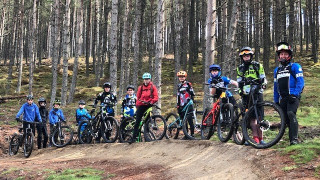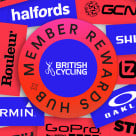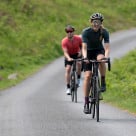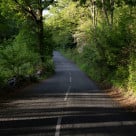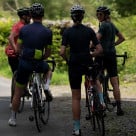Clubs take great value from hearing from others about the approach they are taking to all aspects of their development – but this is particularly true at this present time as we plan for the return of club cycling activity.
For the next instalment of our #WheelsinMotion club case study series, Grampian CDC Julie Erskine chatted to Alan Smith of Ythan CC to hear what the club is doing to support their members’ back to activity post-pandemic.
Formed in 1987, Ythan CC (Ythan is pronounced as in Python) is a cycling club based in Ellon in the North East of Scotland, just North of Aberdeen. Ythan CC’s youth membership are collectively referred to as the Ythan QL (Quines & Loons). Alan Smith is one of three head coach leaders for Ythan’s QL groups and looks after the experienced youth riders (Yellow group).
Alan explained the importance of going back to basics, the club meeting up, doing things together and having fun.
These are the things that he feels make the club and have helped to restore a sense of identity for the QLs after such a prolonged suspension of club activity due to the pandemic. The smiles on the kids’ faces are proof of how they feel about returning to QL coaching. The QLs have personalised hoodies and Alan described the pride they now take in displaying their hard-earned badges sewn onto their hoodies. These badges are part of the system developed by Colin Allanach, past Chair and active member of Ythan CC, around five years ago. The badge system incorporates six-week blocks of structured coaching, with badges to be earned after successfully completing a level.
It is the first time in a long time that the club has utilised the badge system, and it has really helped Alan and his fellow coaches with the return to activity. In particular, the ratio of coaches to kids was one of the main considerations for the club when planning their return. Alongside this was the level of coaching that could be provided. The QLs are split into three groups based on ability. The Polka Dot group for new and/or less experienced riders, followed by the Green group, and the Yellow group for experienced riders. Each of these groups was split into smaller groups to align with restrictions on numbers. The three head coaches discuss their session plans in advance of each coaching session, which are then communicated to the other coaches. The coaching team debrief after sessions, which enables them to learn from each other and share what has worked well and maybe not so well, and Alan says this has been a great help in supporting the coaches with the return to activity.
Alan feels that developing the coaching team has helped the club to cope with the increasing numbers of kids expressing an interest in joining the QL sessions. The club put out appeals to parents to become coaches due to the high number of kids on the waiting list, which Alan explains is due in part to the club changing the location of their training sessions and switching to off-road cycling disciplines of cyclocross and mountain bike. Towards the end of 2020, the club relocated their sessions to the local park in the centre of Ellon and have been using this location again now that sessions have been able to restart. The park offers several advantages for coaching sessions in that it helps to align with Covid-19 regulations and with creating a visible presence for the club in the town centre. Coaches can manage the registration for sessions better by using different parts of the field for each group. Everyone was so keen to get back to the QL sessions and the club now have a full compliment of coaches and over 40 kids attending every week, with an ever-growing waiting list!
The club’s WPO and coaches discuss plans and procedures and then communicate on the club’s Facebook page. Each week the club puts up posts on their club page advising on procedures and the measures put in place for each coaching session. These have included the limited numbers permitted in each group, a revised registration process and reminding parents/guardians not to hang about before and after sessions. These club communications go out during the week leading up to coaching sessions on a Saturday and also include the session plan for that week. Alan feels these have facilitated a smooth return to activity and have helped instil confidence in riders and parents/guardians that returning to club activity is safe.
Another adaptation the club has made post-pandemic is asking parents/guardians to pay by bank transfer instead of cash. Payment used to be taken on a weekly basis, but Alan describes the more structured payment system the club has adopted, where they now use Spond for registration and sending out session invites.
This system makes it clear for everyone, with each six-week block paid for in advance. On the 7th week, the QLs go away and have fun elsewhere. When Julie spoke to Alan, the QLs were preparing to go to the Glenlivet trails where they could put their newly developed skills into practice.
The highlight of returning to activity for Alan and the rest of the Ythan QL coaching team is seeing the kids back having fun. Such a prolonged suspension of club activity resulted in kids losing their drive and Alan feels many kids just lost interest in things. Getting the kids back and fired up and seeing the smiles on their faces as they ride their bikes together again has been one of the best things about the return of QL coaching. It is evident the QLs love the social element of the coaching sessions and they are able to see their cycling friends who they don’t see at school. Alan underlined the wider impact of QL cycling activity, where kids build relationships with others through attending the sessions. Quite often the QLs will head to the park or local trails on their bikes together.

